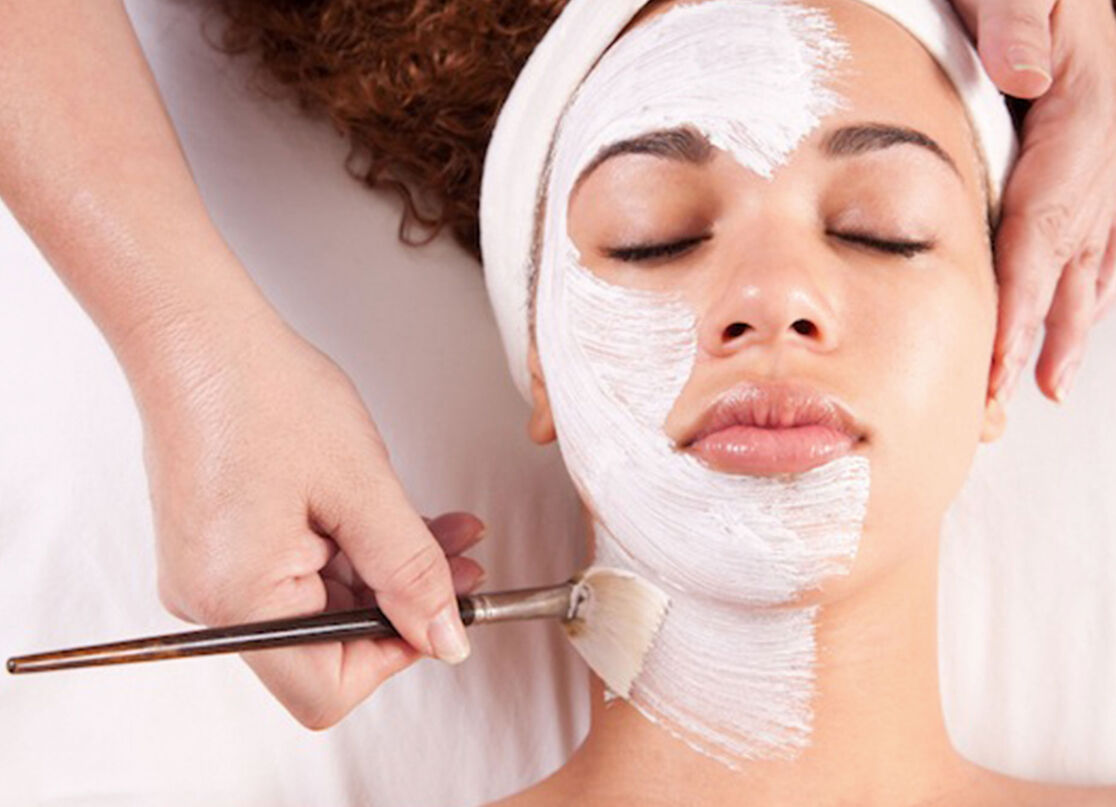When our skin is healthy, it makes us feel vibrant and beautiful. But how do we achieve that glow? We know to wear sunscreen, use safe and plant based skin care products, drink plenty of water…but how do we get real results? That’s where our skin care experts come in — busting skin care myths and sharing their insider know-how, so we don’t waste time, money, or products.
 Mona Gohara, MD, is an associate clinical professor in the Department of Dermatology at Yale School of Medicine and previous Honest contributor.
Mona Gohara, MD, is an associate clinical professor in the Department of Dermatology at Yale School of Medicine and previous Honest contributor.
“Remember, skin is our largest organ and it is subjected to external toxins and germs 24/7,” Gohara says. “Cleansing and moisturization are essential for keeping the skin’s equilibrium intact. Of course, protection against UV light is also essential in terms of optimal skin health.”
 Esthetician Shani Darden tends to the skin of many beautiful celebs and has her own line of skin care products called Resurface.
Esthetician Shani Darden tends to the skin of many beautiful celebs and has her own line of skin care products called Resurface.
“The best thing you can do for your skin is to wear sunscreen everyday no matter what the weather is,” Darden says. “Sun exposure can cause sun damage, discoloration, wrinkles, and skin cancer.”
Check out our Q&A and learn more about how to support healthy and radiant looking skin!
Sun Protection
Q: What level of SPF should most people wear on a daily basis? How do you figure this out?
MG: In order to get optimal protection against harmful, cancer-causing ultraviolet (UV) rays, The American Academy of Dermatology (AAD) recommends use of a broad spectrum SPF of 30 or higher. Luckily, the SPF number is usually clearly marked on the outside of the bottle making it easy to find!
Q: What are safe, alternative sunscreen ingredients and do they work as well as regular sunscreens?
MG: Look for naturally occurring minerals such as non-nano titanium dioxide and zinc oxide when choosing sunscreen. These ingredients are not only safe, but very effective at creating a physical block against UV light — this means they actually deflect the light before it penetrates the skin!
Q: What’s the one place people don’t think to put sunscreen but should?
MG: Their scalp! The scalp can burn very easily and skin cancers here are not easily noticed! Focus on applying it to the part but massage it onto the entire scalp.
Q: Do we need SPF if we work in an office all day?
MG: If you leave your house, or even if you sit in your house next to a window, a broad spectrum SPF 30 or higher should be incorporated into your daily routine. UV light can penetrate windows of homes, offices, and cars (yes, this happens even on a cloudy, snowy, or rainy day). In the United States, left sided skin cancers and facial wrinkling are more common because of driving. Another reason to be diligent with SPF? The visible light that comes from commercial bulbs in our workspaces can worsen skin conditions such as melasma, and other forms of blotchy facial discoloration resulting from sun damage.
Q: If we combine an SPF 15 moisturizer with an SPF 15 foundation, are we getting an SPF of 30?
MG: This is a very common question. The answer is no. SPF is not additive.
Beautiful Skin
Q: Are there safe alternatives to retinol that are just as effective? (The EWG recommends avoiding retinol especially for pregnant women).
SD: A great alternative to retinol is glycolic acid. Glycolic acid exfoliates, removing the top layer of dead skin cells which gives you a brighter complexion. It can also help to diminish age spots, fine lines, and wrinkles.
Q: What specific foods and vitamins can people consume to support their skin?
SD: Foods like brightly colored fruits and vegetables (think spinach, peppers, blueberries and cranberries), contain antioxidants which help reduce free radical damage associated with aging.
Q: What are the basic steps and products needed for a skin care routine?
SD: What you need for an effective skin care routine is to make sure you are using the right products for your skin type. In the morning you should cleanse your skin with a gentle cleanser, use a topical antioxidant and a moisturizer with sunscreen. At night you should use a gentle cleanser, an anti-aging product, such as a glycolic serum or cream, followed by eye cream and moisturizer. You do not need a lot of products or the most expensive products to have a good regime, the quality of the product is what matters. And, as with all health and beauty routines, we recommend discussing specific products and ingredients with your health care provider, as they know you and your health history best.
Q: Why do estheticians use steam during facials? Does steam offer any benefits to the skin?
SD: Steaming during a facial helps to soften the surface layer of dead skin cells which helps to unclog pores. Steaming also helps stimulate blood circulation which gives your skin a nice glow.
Q: How often should we get a facial for beautiful and healthy skin?
SD: Getting facials once a month will help to remove surface dead skin cells and give your skin a glow. Getting facials will improve your skin by cleaning clogged pores and blackheads, smooth the texture and lessen discoloration marks.
Q: What is a safe and natural acne cure? How do we safely get rid of blackheads?
SD: The best way to remove blackheads is by getting a facial by a skin care professional who can extract them without causing damage to your skin.
Q: At what age should we start using wrinkle serums?
SD: You’re never too young to start using anti-aging products. The best one being sunscreen.
Q: Are under eye creams important for preventing wrinkles and dark spots? What ingredients should we look for?
MG: The most important factor in preventing dark spots and wrinkles is diligent protection from UV light (SPF, hats, sunglasses, and protective clothing). Ninety percent of the visible signs of aging come from the sun, and proper use of SPF, even later in life, can slow the aging process tremendously. That being said, the skin around the eyes is a common culprit for fine lines.
Q: Are scrubs good for the skin? We’ve heard mixed things—some say they’re too harsh and scratch the skin, while we’ve also heard that they’re great for exfoliating.
MG: The process of exfoliating is very useful in maintaining skin health. It helps to remove dead skin cells, and allows for penetration of moisturizers and other beneficial skin care products. The key is to be gentle, and to listen to the skin. Based on skin type, each individual should seek optimal intervals for this (perhaps once every few weeks for those with dry skin or once a week for others with oily skin). The act of scrubbing is not ideal for anyone as it creates small micro-tears in the skin and excessive dryness. Be gentle and mindful even when exfoliating.
Q: How long does it take your skin to get used to a product? Should you switch products every so often?
SD: If you are using products that are working for your skin type, there is no reason to switch to new ones. The only time it is necessary to switch is if something isn't working or when the weather changes. During the summer when your skin is oilier you may need a cleanser with salicylic acid in it, but in the winter when your skin tends to get dry, you may need something more gentle.
Q: How long should you expect to use a product until you see lasting results?
SD: When you are using products for anti-aging or acne, you need to give them time to work. Some products can take up to a month before you see results.
Skin Health
Q: How often should we have moles checked by a dermatologist?
MG: The AAD recommends yearly skin checks by a dermatologist starting at the age of 40. That being said, someone who has a personal or family history of skin cancers may need to go at an earlier age or more frequently.
Q: Does drinking lots of water really help skin look healthy?
MG: Staying well hydrated helps in overall health. An added benefit is that it makes fine lines and wrinkles less apparent, and makes the skin appear radiant.
Q: How does our diet impact our skin?
MG: Diets that have a high glycemic index increase the body’s cortisol/sugar levels and can wreak havoc on the skin in the form of acne or aging. Conversely, diets high in antioxidants contribute to skin health and very effectively combat the hands of time.
Q: What is one skin issue you wish people would visit a dermatologist about more often?
MG: Just to get an overall idea of what an optimal daily skin care regimen entails.
This post is solely for informational purposes. It is not intended nor implied to be a substitute for medical advice. Before undertaking any course of treatment or dietary and/or health changes, you should seek the advice of your physician or other health care provider.
We aim to provide you with the most honest and credible information possible. This article was reviewed for accuracy by The Honest Team and was written based on sources that are linked at the bottom of the article.
blog_review_statement



